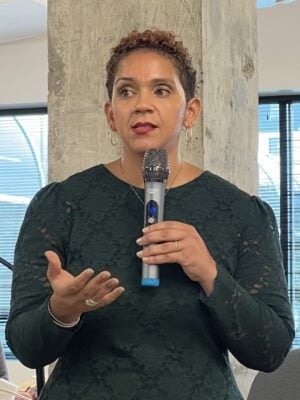Ashley Scruggs knew motherhood wouldn’t be easy, but her postpartum journey was especially challenging.
With the support of her doula, Stacy Booher, Scruggs navigated months of health issues before finally being diagnosed with lupus. Her story is one of resilience, but it also reflects a deeper issue: Black mothers in Marion County often face obstacles in receiving timely, effective care.
Hosted by Just Community, the “Elevating the Standard of Care” event highlighted stories like Scruggs’ to push for change in Black maternal health. Emphasizing the importance of doulas, community action and a need for change, these conversations have been at the forefront of Hoosiers’ minds for many years.
In 2020, the maternal mortality rate for Black women was 93% higher than for white women. Indiana alone has the third highest maternal mortality rate in the U.S., according to the Indiana Maternal Mortality Review Committee report.

“We have one of the worst records in our nation (for maternal mortality),” said Dr. Nicole Carey, executive director of Just Community. “So, right here in my backyard, we have this crisis, and it wasn’t just last year or the year before but multiple years and counting.”
Carey and her colleagues started doing research through the Indy Equity Collaborative after receiving the Early Years Initiative grant in February. They started going into the community around the 46222-area code and researching why the infant mortality rate was so high.
“We started our research in Haughville and speaking to those neighbors, those community leaders, and when we started to speak to doulas, we realized this is not a 46222 question. This is a countywide question,” Carey said.
From there, Carey applied for the Indianapolis African-American Quality of Life Initiative and now receives funding to train doulas like Booher, who provide emotional, physical and informational support during pregnancy, birth and postpartum.
Carey and other Black mothers like Scruggs found that doulas bridged the gap of care and helped guide them in a system that has downfalls for people that look like them. The only problem is there is little funding for expecting mothers to get one and for people who desire to become one.
“We then explore what does it look like for us to train, to educate care providers to then be able to give that education to their communities, the people that they love and care for,” Carey said. “So, these are all things that we are exploring at Just Community.”
In addition to providing the community with resources and information, the event featured a panel of experts discussing Black maternal health and what the future looks like in Indiana.
U.S. Rep. Vanessa Summers (D-Ind.) spoke about the importance of knowing your legislators and how history has repeated itself when it comes to Black maternal mortality rates.
“I think what resonates for me is that in 2024 we are still having this problem, and what I like is this collective where we are able to take our stories and turn them into action,” Summers said.
Ashely Rainey-January, clinical director at the Indiana Department of Health, spoke from a health care provider’s experience, but also a Black woman’s experience.
“We are still the highest for maternal mortality. Our babies are still more prone to dying even if I had a healthy childbirth, and that’s a shame,” Rainey-January said. “Something has to change.”

Scruggs, who is the vice president of talent and culture at United Way of Central Indiana, emphasized the pressure on Black women and how that negatively affected her health after she gave birth.
“Stacy gave me liturgy, all of this stuff to help me understand what was happening to my body,” Scruggs said. “I was very much in denial because I’m strong, and we’re told to be strong. I had to take a step back and say, ‘Actually, I am struggling and something isn’t okay.’”
Joslyn Cunningham, director of community advancement at Just Community and a certified doula, highlighted the work of doulas and how they can be valuable to a marginalized group like Black mothers.
“I don’t believe in coincidences, but my first three births at the hospital were in the same exact room every single time,” Cunningham said. “We want to come from a collaborative lens.”
Following the panel discussions, the group encouraged participants to do more than just listen but be active and utilize resources beyond the event to create change.
“For those that are feeling like, ‘I just need to do something,’ or ‘I want to make an impact,’ follow through,” Scruggs said. “Because a lot of times we come to these kinds of conversations, and we’re so excited, and it’s so important, but follow through. Continue to do whatever you’re feeling right now with the power that you’re given and the influence that you have. Follow through.”
For more information about Just Community and to support their work towards a better future for Black mothers, visit justcommunityindy.org.
This reporting is made possible by a grant from the Indianapolis African-American Quality of Life Initiative, empowering our community with essential health insights. https://iaaqli.org/
To read more health stories, click here.
Contact Health & Environmental Reporter Hanna Rauworth at 317-762-7854 or follow her on Instagram at @hanna.rauworth.
Hanna Rauworth is the Health & Environmental Reporter for the Indianapolis Recorder Newspaper, where she covers topics at the intersection of public health, environmental issues, and community impact. With a commitment to storytelling that informs and empowers, she strives to highlight the challenges and solutions shaping the well-being of Indianapolis residents.








